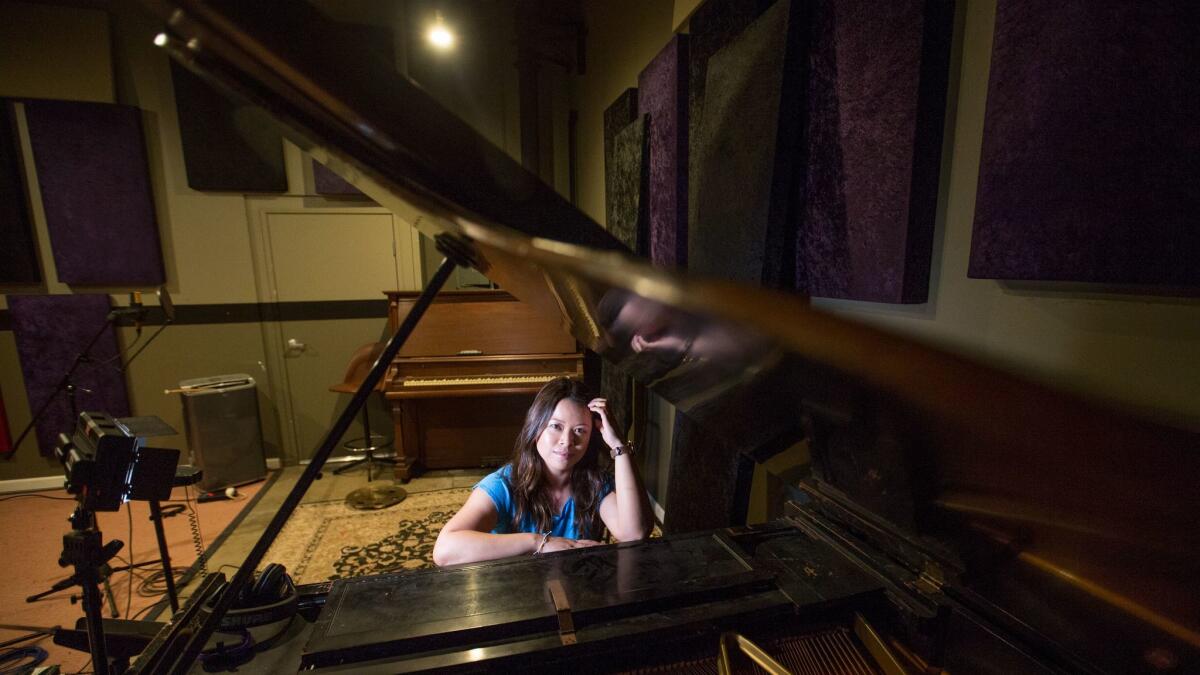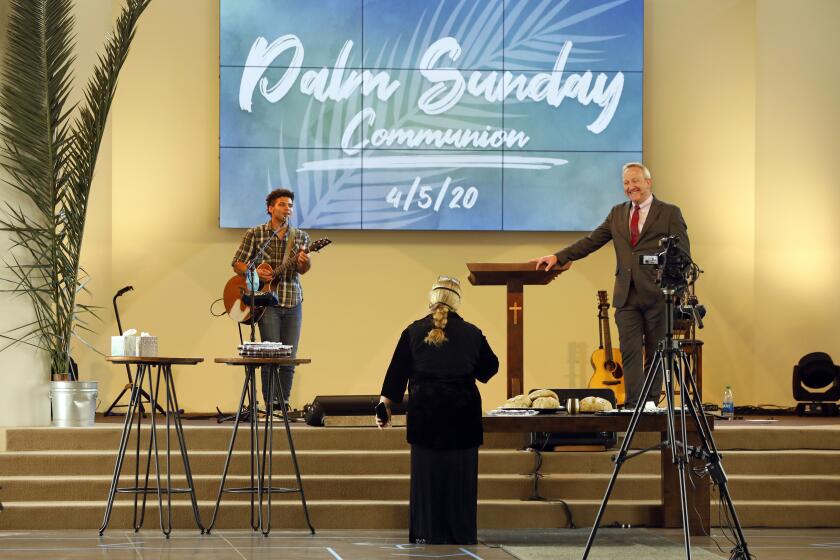Divorce was long taboo for Vietnamese immigrants. After years in the U.S., they’re accepting it more

For years, Mimi Ho endured a long list of demands from an insistent husband and a coterie of in-laws and assorted aunts and uncles.
The Vietnamese immigrant, a nanny who also sells clothes to make a living, felt she was living not in a marriage, but a state of servitude.
“It was do this, do that, cook and clean and fetch and sew,” said Ho, 48, of San Jose.
When she longed for escape, phone calls would come from Vietnam, with her mother pleading with her to stay in the union.
It was her youngest sister, Susie — her only American-born sibling — who persuaded her to strike out on her own.
“Don’t you have any self-respect, she wanted to know. This is America,” her sister told her. “Our parents abandoned everything to come here so they could be free. She pushed me to be free.”
In getting a divorce after 16 years of marriage in 2015, Ho joined a growing number of immigrants bucking what had been a taboo they brought with them more than four decades ago as refugees from the Vietnam War.
Many who came after the battles ended in 1975 often pushed back against any mention of splitting up, putting pressure on their children or themselves to keep nuclear families intact.
Vietnam still has one of the lowest divorce rates in the world, less than a tenth the rate of the U.S., which has one of the highest, according to United Nations’ data on families.
The low rate of divorce was partly explained by the large numbers of Catholics in the Vietnamese community. Moreover, when refugees resettled in America, many arrived with few belongings, if any. Staying together helped them cope with the challenges of learning a new language, making a livelihood and adapting to a new life in a foreign land.
But over the decades, the same forces of assimilation that effected change in previous immigrant groups took hold.
Today, the divorce rate for Vietnamese Americans, while still below the national average, is getting closer. According to a study of U.S. Census data by University of Maryland sociologist Philip Cohen, there are about 16 divorces per 1,000 marriages among Vietnamese Americans. The national average is 19.
“Before, people felt this duty to stay married because of finances or because they were sponsored to come to this country together or traditional expectations. They don’t seek help due to shame,” said Linda Vo, professor of Asian American studies at UC Irvine. “Once they see more adults making this decision, as they see these situations become more mainstream, they’re able to come to terms with what they need to do.”
In neighborhoods like Orange County’s Little Saigon, the signs are, literally, everywhere.
Around the country’s largest concentration of Vietnamese immigrants and their children, vendors drive cars with signs touting convenient divorces while fliers stapled to bulletin boards, tree stumps and lamp posts advertise quick-split services. Magazine and newspaper ads for attorneys used to list services such as assistance with citizenship, green cards or student visas. Now, they also tout convenient divorces.
Some advertising offers help with immigrant visas to bring fiancees or spouses from a foreign country such as Vietnam into the U.S. — others hawk easy, “no headache” fixes for couples wanting to part ways.
Tina Pham Dao Bach Tuyet, an attorney in Westminster who specializes in family law, said about 70% of her cases involve divorce. Week to week, she answers questions on separation, the dissolving of marriages, alimony, child support and more on her regular radio and TV shows.
“I let it all out in the open. People appreciate the fact that we don’t hide these topics,” she said. “Sometimes, I get the men who ask: ‘Why did you bring that up? My wife never knew she was entitled to my 401(k).’”
Vietnamese American community agencies do not collect statistics on divorce, but Pham said it’s clear that the family dynamic has changed over the years.
“In the past, parents could decide to live separate lives and avoid shattering the family for the children, knowing some of their own parents or grandparents would have done the same,” she said. “Now it’s the kids who are urging their mom and dad to leave. They went to school here and they don’t hesitate to absorb the Western lifestyle. They ask them: ‘If you’re miserable with each other, why stay?’”
Not only are couples choosing to split, “they are now willing to see it through litigation,” according to Lynn Quach, who practices in Newport Beach, specializing in divorce. “Before, it was, ‘I want to settle.’ But these days, people try to get what’s fair and as their comfort level has increased with social acceptance, as the Vietnamese have a better grasp of English, they push to go to court.”
Pham said another factor has played a smaller role in the rise of divorces: As more men return to Vietnam for business or for travel, they meet younger, far more traditional women, some whom they end up marrying.
Richard Dao, 60, first glimpsed the woman who would become his second wife as she worked as a server in a restaurant in Da Nang, along Vietnam’s coast.
“She was so gentle and so sweet, it was hard to ignore,” said the businessman from Garden Grove.
He had grown tired of what he labeled “the equal-rights positions of California Vietnamese women” and longed to be with someone more “old fashioned.”
The person he met was nearly 20 years younger when they married in 2013. She later settled in a town home with Dao, after he emerged from a bitter divorce in which he lost child custody.
“I do not have a regret,” he said.
Dao said Vietnamese Americans are “more used to the term divorce in these times. It comes up in casual conversations and people don’t whisper about it anymore. I have a lot of co-workers who look like they have a perfect family life, but they’re actually on their second husband or wife and rebuilding their lives. Refugees are resilient.”
The prospect of exiting her marriage made Giana Nguyen, a singer and songwriter who runs a piano school, worry about the effect it would have on her son. Over the years, the 38-year-old said divorce had lost some of its stigma as peers eased into American life, pursued college and opened businesses. Her own parents had parted.
After getting a divorce in 2016, Nguyen, who wrote a breakup song and was later invited to perform the national anthem at a Lakers game, said she found her 4-year-old has adjusted better than she envisioned.
“It’s especially important since he’s on the autism spectrum. Everyday things like nutrition, sleep schedule, discipline, potty training, daycare, school, therapy sessions, extracurricular activities — all of it has to be very organized between his father and me,” she said. “But the most important thing is making sure he always, always feels loved, no matter where he’s sleeping that night.”
Hairstylist Nga Nguyen, 51, who keeps tabs on community publications, said she saw a rise in the number of lawyers adding divorce to their repertoire of personal injury and immigration services. She left her marriage to a Boeing engineer over 10 years ago.
“I was very bold,” she recalled. “My husband was someone who did not follow his own will, living under too much influence from his family. I didn’t have any rights being with him, and I asked why not? Why tolerate that?”
The Santa Ana mother of two said her youngest child, Benjamin, 18, told her:
“Mom, one person likes to turn on the light, one person likes to turn off the light. You and Dad are like that, and why keep fighting? You each can get your own house and do whatever you like.”
Nguyen said “that sums up Vietnamese kids in America. They have the liberal mindset of Americans.”
Taylur Ngo, 38, sat with her parents for three hours, talking about the possibility of divorce back in 2013.
“They were very surprised. They had no idea we were on the verge,” said the San Diego marketing manager. “But ultimately, they supported me. They offered me unconditional love in the face of something they were very unfamiliar with — even if I disappointed them.”
Ngo said the change was the inevitable result of people who came as refugees becoming full-fledged Americans.
“Vietnamese parents say: ‘Don’t become an artist. Don’t be gay. Don’t get divorced.’ The taboos are unnecessary,” she said. “We have become citizens of both worlds. And part of the American experience is to embrace what you’re so scared of in the old country.”
Twitter: @newsterrier
More to Read
Sign up for Essential California
The most important California stories and recommendations in your inbox every morning.
You may occasionally receive promotional content from the Los Angeles Times.











